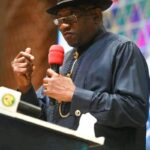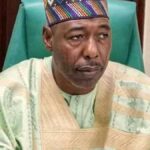As we approach our Independence Day celebration on October 1, one reality stairs at all of us.
That reality is the current state of the nation. We are not happy because our God-given land is bleeding. Most Nigerians are in pains apart from the few who have access to state privileges. As usual, prayers will be offered in mosques and churches to solicit God’s intervention in our land on the 1st of October. Charismatic and gifted speakers and preachers will be used across the country to offer hope and words of encouragement without calling a spade a spade. The hopelessness of the Nigerian state is increasingly becoming indescribable especially for those who on account of being Christians, now live in their own country as “internally displaced persons.”
In this reflection, we will draw inspiration from the second of the seven letters to the church in Asia Minor. I will also cite a substantial part of Open Door’s 2019 report on the persecution of Christians. First, from Revelation 2: 8-11: “To the angel of the church in Smyrna, write this: The first and last, who once died but came to life, says this: I know your tribulation and poverty, but you are rich. I know the slander of those who claim to be Jews and are not, but rather are members of the assembly of Satan. Do not be afraid of anything that you are going to suffer. Indeed the devil will throw some of you into prison that you may be tested and you will face an ordeal for ten days. Remain faithful until death, and I will give you the crown of life”
The Christian community in Smyrna, was insignificant and poor, living in the midst of wolves that were willing to attack it at the slightest provocation. The angel said: “I know your tribulation and poverty” (Revelation 8:9). The Christians of Smyrna at the time belonged to the lower class of the society. We know for instance, that in Rome, the poorer classes literally starved because contrary winds delayed the shipment of corns from Alexandria. (W Barclay Revelation 2010). Another reason for the poverty of the Christians in Smyrna is that they were subjected to constant dispossession of their property and means of livelihood (Hebrews 10:34). There were times when a mob would suddenly attack the Christians and wreck their homes. Life was not easy for Christian in Smyrna.
The experience of the early Christians in Smyrna resonates with us here in Nigeria just like many of our brothers and sisters around the globe. Open Door International is an organization committed to the plight of persecuted minorities round the globe. The organization in its 2019 reports on the plight of Christians in North Korea, made this observation: “If North Korean Christians are discovered, they are deported to labor camps as political criminals or even killed on the spot. Driven by the state, Christian persecution in North Korea is extreme and meeting other Christians to worship is nearly impossible unless it’s done in complete secrecy. A recent increase in diplomatic activity, starting with the 2018 winter Olympics in South Korea has not changed anything for the Christians in the country” (Open Door Reports 2019).
The report continues: “Christians must keep their faith completely secret. If a Christian has a Bible, or part of one, it will be carefully hidden and only read when the believer is sure they are alone. Most Christians do not even tell their own children about their faith until the kids are older teenagers, for fear that they may let something slip.When Christians are discovered, they will be arrested and imprisoned in one of North Korea’s terrible labor camps, where they are meant to work like slaves and often tortured; most are never able to escape.The news tells stories of the country’s ambitions on the world stage. Yet behind the headlines, a massive underground church of 200 – 400,000 Christians is growing in North Korea. And tens of thousands of these secret believers are held in North Korea’s infamous labor camps. It is a miracle that this underground church is able to exist. But more than that, it is thriving and growing. One Christian has shared: “One day the borders will open and we will unite with the South Korean and the Chinese church to bring the gospel to some of the darkest places on this earth” (Open Doors Report 2019).
The unreported horrifying stories of persecuted Christians round the globe should make a person with conscience and a human heart to shudder. I am moved many times to look at my watch and to look at the calendar to verify in which century we are living. It is the 21st century and all that we read about is real, and happening to people. For the persecuted Christians in northern Nigeria, the government appears rudderless about how to define the killings of Christians by Boko Haram and herdsmen. There are debates as to whether to suggest the killings are religiously motivated. The denial of the obvious makes whoever, accomplices in the shedding of innocent blood of their citizens. While some people are quick to excuse the villains who terrorize and maim Christians, our authorities demonstrate their approval of the killings when they apprehend Christians for blasphemy. Three pastors were recently arrested by the order of Katsina State Police Command. Pastors Daniel Barau, Idris Saje and Audu Bakwai were accused of converting or aiding Kamal to convert from Islam to Christianity. The Da’awa group in Katsina State asked the police to detain the pastors and to order the return of Kamal to his former faith or to face death.
As we all approach the celebration of sixty years Nigeria’s independence, the ending verse of the chapter we cited, offers hope to the persecuted: “Do not be afraid of anything that you are going to suffer. Indeed the devil will throw some of you into prison that you may be tested and you will face an ordeal for ten days. Remain faithful until death, and I will give you the crown of life” (Revelation 8:11). Faithfulness in the midst of persecution is what defines the resilience of the Christian struggle. Northern Nigerian Christians are united in pains with fellow persecuted Christians round the globe. The common denominator in their suffering is their Christian faith. We stand with the suffering Christians in northern Nigeria. We also remember the persecuted Christians in faraway North Korea.
Fr Stephen Ojapah is a priest of the Missionary Society of St Paul. He is equally the director for Interreligious Dialogue and Ecumenism for the Catholic Diocese of Sokoto, a member of IDFP. He is also a KAICIID Fellow. ([email protected])

 Join Daily Trust WhatsApp Community For Quick Access To News and Happenings Around You.
Join Daily Trust WhatsApp Community For Quick Access To News and Happenings Around You.


